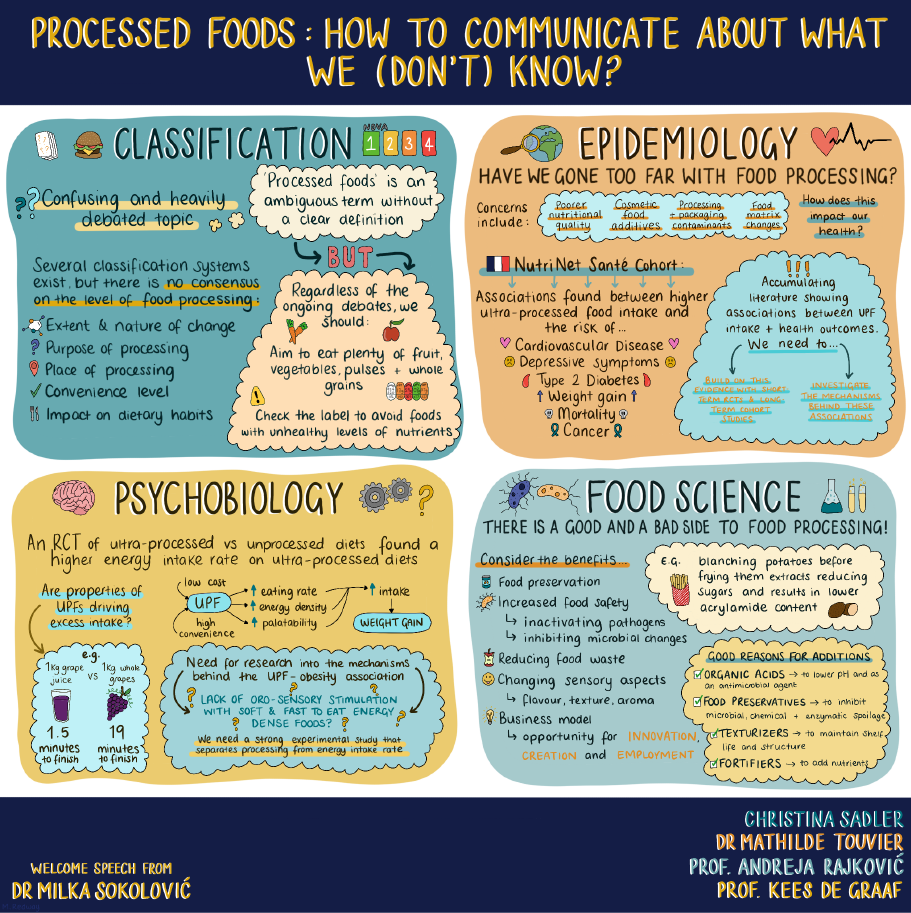Processed foods symposium: How to communicate about what we (don’t) know?
Last Updated : 30 November 2020On the 24th of November, EUFIC organised an online symposium: ‘Processed foods: how to communicate about what we (don’t) know?’.
This EUFIC symposium brought together different perspectives on processed foods. It summarised definitions, concepts and classifications, discussed epidemiological and public health issues around processed foods, shed light on insights from sensory and behaviour science, and highlighted the impact of food processing from the food technology angle.
With the topic of processed foods now hotly debated far beyond the domain of pure science, the aim of the symposium was dual: to recognise the key points of scientific (dis)agreement, and to identify opportunities for and barriers to balanced, evidence-based communication around the topic.
Learning from the experts in the fields about their own work promises to get us a step closer to a clearer, more effective communication around processed foods.
Programme & slides
- 0:00 - Welcome: to the processed foods paradox?
Dr Milka Sokolović (European Food Information Council) - 10:15 - Processed food classifications: concepts and issues
Christina Sadler (European Food Information Council / University of Surrey) - 20:00 - Ultra-processed food and health: epidemiological evidence
Dr Mathilde Touvier (Nutritional Epidemiology Research Team (EREN) / INSERM) - 36:10 - Psychobiology behind the effect of ultra-processed food consumption on energy intake
Prof. Kees de Graaf (Wageningen University & Research) - 51:20 - Risk/benefit considerations for food processing at the nexus of food safety and health
Prof. Andreja Rajković (Ghent University) - 1:08:16 - Time for burning questions
- You can download the answers to the top 10 questions here.
- 1:22:07 - Closure: any closer to clarity?
Visual summary (by Martha Redway)

Speaker biographies
Dr Milka Sokolović (Head of Food & Health Science, European Food Information Council, Belgium)
Equipped with a degree in Biology from the University of Belgrade, and a PhD in Medicine from the University of Amsterdam, Milka leads EUFIC’s Department of Food & Health Science, where the complex science gets translated into “human” language - to help people make sense and use of it. Until taking a U-turn and switching from conducting to talking science, her work focused on studying the intermediary metabolism in response to starvation and obesity. In addition to research, she was getting inspiration from teaching subjects like medical biochemistry, DNA technology, metabolism, genomics of disease.
In parallel, Milka acts as a Director of the Advanced Programme of the ENLP, the European Nutrition Leadership Platform, where food and nutrition professionals get equipped with leadership skills, helping them to make a lasting difference in the public health landscape.
Christina Sadler (Senior Manager – Food & Health Science, European Food Information Council / Postgraduate researcher, University of Surrey)
Christina communicates science-based information on food and health at the European Food Information Council (EUFIC), where she is a Senior Manager.
Equipped with her nutrition training and communication expertise, she is leading a collaborative PhD research project between the University of Surrey and EUFIC, which aims to understand perceptions of processed foods. This PhD study examines how processed foods are conceptualised, by both experts and consumers. As part of this research, she has recently reviewed processed food classification systems and the surrounding debates, and some of the learnings will be presented in this symposium.
Dr Mathilde Touvier (Director of the Nutritional Epidemiology Research Team (EREN) / Research Director at INSERM, France)
Dr Mathilde Touvier is a Research Director at INSERM, principal investigator of the NutriNet-Santé cohort. She is the Director of the Nutritional Epidemiology Research Team (EREN Inserm/Inrae/Cnam/Sorbonne Paris Nord University).
She coordinates research on the associations between nutrition and disease risk (PI of several projects funded by the European Research Council, the French National Cancer Institute, etc. and WP leader in a H2020 JPI HDHL project). She is an author (/co-author) of >225 publications and expert in several workshops at the French National Cancer Institute (INCa), French Agency for Food, Environmental and Occupational Health & Safety (ANSES) and International Agency for Research on Cancer (WHO-IARC), European Commission (EU DG Health and Food Safety) and for the Global Burden of Disease.
Prof. Kees de Graaf (Professor Sensory Science and Eating Behaviour, Wageningen University & Research, the Netherlands)
Kees de Graaf is professor in Sensory Science and Eating Behaviour at the Division of Human Nutrition and Health of Wageningen University, the Netherlands. He has published about 300 papers, and his research and teaching activities focus on the meaning of sensory signals for eating behaviour and regulation of energy intake.
His work focuses on reformulation of foods to moderate energy intake while maintaining palatability of foods. Key concepts include eating rate (g/min) and energy density (kcal/g), together making up the energy intake rate (kcal/min). This perspective may help to design attractive foods of which people do not easily overeat.
Prof. Andreja Rajković (Professor in Microbial Food Safety, Ghent University, Belgium)
Andreja Rajković is a research professor at Ghent University with a strong track record in food safety and food science research. He studied Food technology at the University of Belgrade and obtained his master’s degree at Ghent University. He continued at Ghent University to obtain a PhD in Applied Biological Sciences in microbial food safety and bacterial toxins. In subsequent postdoc years he pursued research as a scholar funded by Research Foundation Flanders (FWO), European Commission and Belgian Ministry of Public Health with activities primarly focusing on microbial food safety, the toxicity of mixtures, microbial toxins, host-pathogen interactions and food—environment-host interface.
Besides teaching at Ghent University, he also teaches at Ghent University Global Campus (Songdo, South Korea), the University of Belgrade and the University of Padova. He is (co-)author of about 200 publications and Founding Editor-in-Chief of the International Journal of Food Contamination.